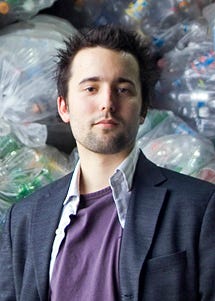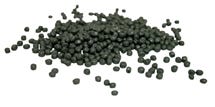TerraCycle takes on plastic recycling’s “untouchables”
A company founded in 2001 by a 19-year-old Princeton University freshman is increasingly finding a home for "un-recyclable" plastics and bridging the gap between consumers of everyday items like drink pouches and the brand owners that create them. Now, Tom Szaky, a grizzled 28-year-old that was named to Inc. magazine's 30 under 30 list at 24, and his company, TerraCycle (Trenton, NJ), are reaching out to the plastics industry.
July 22, 2010
A company founded in 2001 by a 19-year-old Princeton University freshman is increasingly finding a home for "un-recyclable" plastics and bridging the gap between consumers of everyday items like drink pouches and the brand owners that create them. Now, Tom Szaky, a grizzled 28-year-old that was named to Inc. magazine's 30 under 30 list at 24, and his company, TerraCycle (Trenton, NJ), are reaching out to the plastics industry.
|
TerraCycle's Tom Szaky |
"[Terracycle] is extremely interested in talking to as many plastic manufacturing companies as we can," Szaky said. "From a plastics company's perspective, we're sort of like a Gore-Tex in the space, in that we can offer something that we don't think anyone else has—something that has a great story around it, great performance, and great price. So we'd love to find more companies that would like to use the materials."
From worm poop to waste streams
Founded as a supplier of an organic fertilizer based on worm excrement, TerraCycle transitioned into a new model for recycling in 2007 that allowed groups of people to form "brigades" that would collect items their municipal recyclers didn't want and then send them back to the product's manufacturer. That year, the company's first venture into the space, the Bottle Brigade, grew to 5000 participants. By August, TerraCycle launched the Drink Pouch Brigade, with founding sponsor, Honest Tea. In coming months, brigades for yogurt containers and energy bar wrappers formed, sponsored by Stonyfield Farm and CLIF BAR, respectively, and Szaky and TerraCycle dove headlong into the concept of "Sponsored Waste."
In the new model, brands fund TerraCycle to create brigades, which are essentially national collection programs, for what had been non-recyclable waste. As an example, chip maker Frito-Lay funds a program with 7700 collection teams. These teams consist of groups like schools, offices, or churches, with an average membership of around 200 people. These groups collect Frito-Lay or any other brand of chip bag, download a free shipping label from TerraCycle's website, and ship the container of bags to TerraCycle. Once TerraCycle receives the bags, its make a donation of two cents/per piece of garbage to the group's account, which can then be allocated to any school or charity in America. The chip-bag program has collected almost 3.7 million bags and donated, or resulted in the donation of, just under $74,000.
For a more established program like drink pouches, the numbers are much larger and continue to expand every year. Drink pouch brigades have collected 74 million pouches, generated almost $1 million in donations, and are now collecting close to 2 million pouches/week. Szaky says that equates to almost 2% of that entire waste stream. "What a lot of brands are using us for," Szaky says, "is to create the equivalent of a privatized recycling system around their waste." The eventual goal is to lift the collection rates of these former "packaging non grata" to 25% of their annual production.
Expansion around the globe
At this point in time, TerraCycle has offices and full programs in Canada, the U.S., Mexico, Brazil, and the UK. Before the end of 2010, it will launch programs in Sweden, France, and Ireland. After that, there are 10 more markets set to start in 2011, including Argentina, Uruguay, Chile, Turkey, and Israel, with the balance primarily Europe.
Once the waste is collected, it's then converted into products, ranging from back packs to fencing. "As the waste comes in," Szaky explains, "we look at how can we manipulate [it], make it into usable products."
For juice pouches, TerraCycle can sew them into a fabric; shred and compress into board; or pelletize. On that last item, plastic converters are increasingly sourcing the pelletized scrap to make new products.
"The unique twist is these are things that were never recycled before and are now being used to substitute virgin materials," Szaky
|
TerraCycle is now promoting the pellets gleaned from its waste collection for use in new products. |
says. "It's also cheaper because we get paid to collect the waste so we don't have the same economics as if we had to buy the waste and convert it like a normal recycler." Szaky says at this time, 90% of the company's volume is in pellets, with products taking up around 10% in goods like Doritos hand bags or Oreo bows.
1 billion pieces/quarter and growing
At this point in time, Szaky estimates that the company takes in around 1 billion pieces of garbage/quarter, with annual growth rates anywhere from 40-100%. In the U.S., it has five warehouses covering around 1 million ft2. The company outsources conversion, and while Szaky couldn't estimate how many pelletizing companies he works with, he did say the company would re-process around 30 million lb of waste plastic this year, with the caveat that "that number typically doubles or triples year over year."
The model has traction, with half of all public schools in the U.S. signed up for some sort of brigade, and it seems like it might finally crack the plastics recycling nut that has given many parts of the industry a black eye in recent years.
"With non-recyclable materials, it's not that they're non-recyclable," Szaky says, using a polypropylene yogurt cup as an example. "The reason, as far as we can understand, that polypropylene or these other flexible packages, are not accepted in our recycling system, is because they can't finance themselves. So for a lot of these waste streams, that's why there has to be the funding from the brands, because the collection and conversion need to be subsidized to actually make it economical. The irony is every waste stream we've ever been presented, we've solved, easily." —Tony Deligio
About the Author(s)
You May Also Like




